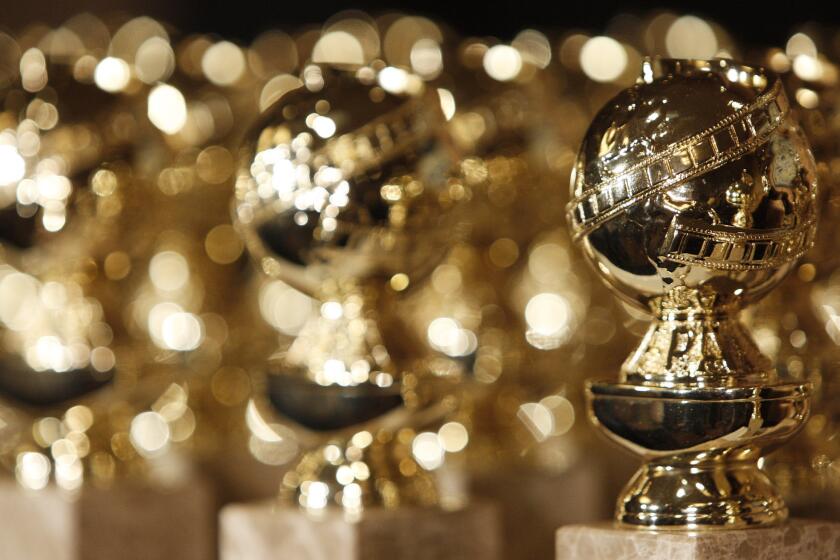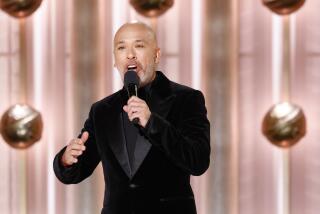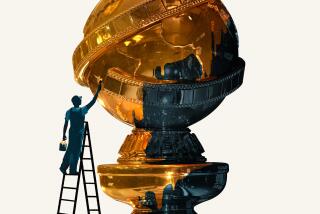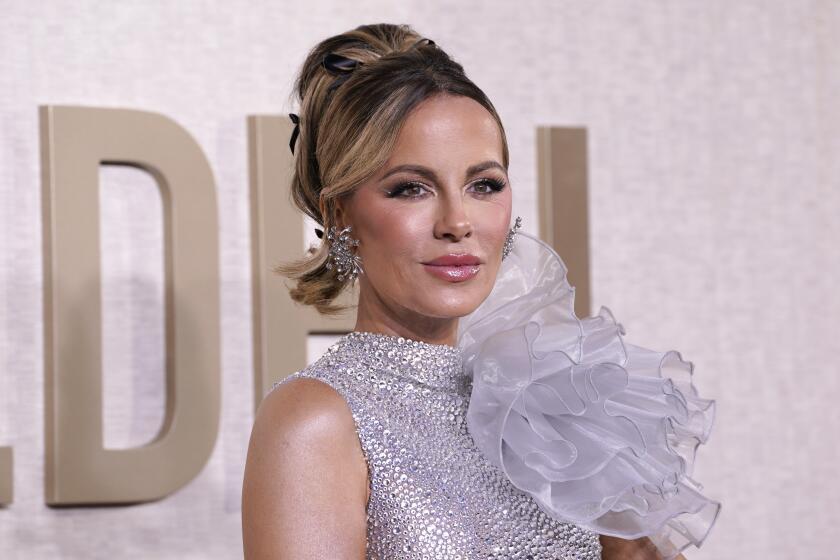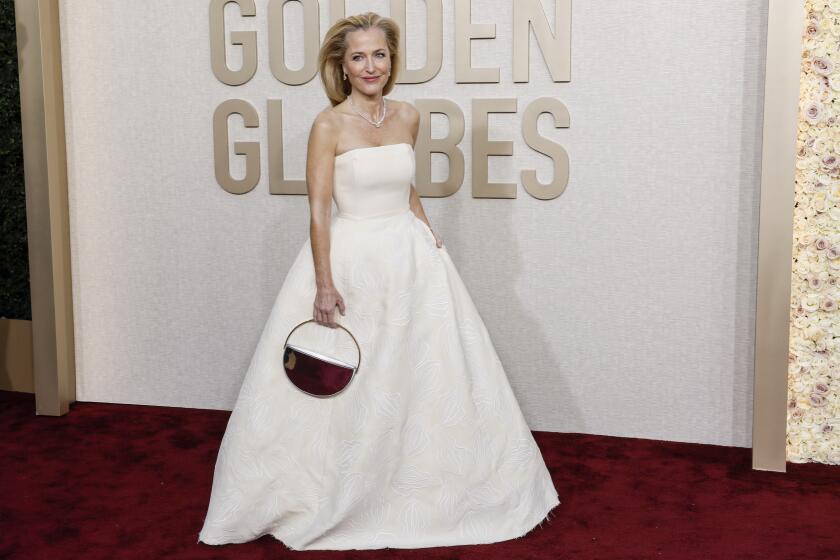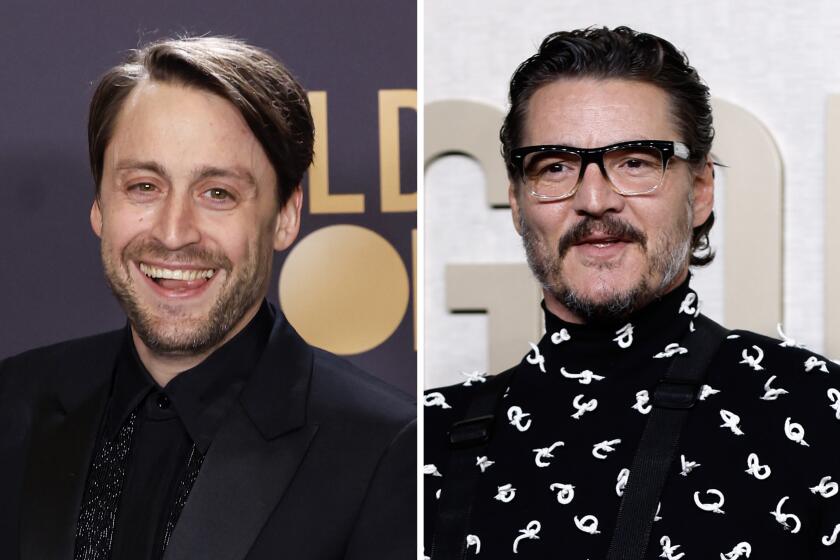Column: The Golden Globe nominations are utterly ridiculous. So why do they still matter?
You might look at this year’s Golden Globes nominations — the snubbing of all four Black-led ensembles for best motion picture drama, the strange salute to James Corden’s obnoxious overacting in “The Prom,” the love for the wretched “Ratched,” the two nominations for “Music” — an apparently misguided Kate Hudson movie directed by Sia that no one has ever heard of — and think, “Who are these weirdos in the Hollywood Foreign Press Assn. and why do they like Ryan Murphy so much?”
Believe me, those are questions that everyone in Hollywood asks on an annual basis (especially in this claustrophobic pandemic year), even if most people already know the answers and are feigning ignorance.
If you asked Norwegian writer Kjersti Flaa, she’d tell you (or, at least, she’d direct you to her lawsuit) that the HFPA is an “illegal cartel” operating under a “culture of corruption” and ... um ... also that she’d really like to join the 87-member group. (That’s not going to happen. The HFPA rejected her again — maybe because, I don’t know, she sued them? — and a federal judge dismissed her antitrust lawsuit in November.)
Flaa’s conflicting actions toward the HFPA — you are positively awful ... but please show me some love — neatly sum up how Hollywood views this group of pretend journalists (there is a handful of working, credible members) and its annual awards show. In normal times, actors, filmmakers and TV producers grind their teeth and submit to the unpleasant rite of the HFPA press conference — inane questions followed by the expected photos taken with each member — to curry favor and earn a spot at the Golden Globes ceremony, the one awards show that hasn’t seen its ratings crater in recent times.
‘Promising Young Woman’ surprises. ‘Minari’ and four excellent Black-led ensembles snubbed. And more.
For Hollywood, Globes are about marketing. The HFPA’s timing is impeccable, even if the behavior of its members isn’t. In normal times, movie studios and streamers piggyback off the nominations to promote their Oscar contenders playing in theaters, while their television counterparts hope their new programs will get a publicity boost that can carry them through the Emmys.
In other words: The Golden Globes are important because, in the awards season ecosystem of publicity, personal resume-building and ego gratification, they have been deemed important by a not-so-secret-handshake agreement. If you don’t think Corden’s publicist didn’t immediately rewrite his bio to read “James Corden, a Golden Globe nominee for ‘The Prom’ ...” then you either A) have better things to think about or B) believe Corden’s nomination to be a “hate crime.” (Note: Both answers are correct!)
Here’s the thing though and ... I ... am ... having ... a ... difficult ... time ... writing ... this ... but, because of the fortuitous timing, the Golden Globes can be an accidental force for good. I’ll give you an example. When “The Office” was in its second season, ratings were mediocre and NBC was hedging its bets about renewing it. Then, unexpectedly, Steve Carell earned a Golden Globe nomination for his brilliant lead turn as Michael Scott. (Carell never won an Emmy for this iconic performance. But that’s another story about another problematic awards show.)
Anyway, Carell somehow won the Globe (the rest of the cast wasn’t even invited to the show and watched the ceremony from a parking garage rooftop, getting, in the adorable words of Jenna Fischer, “super-duper drunk”) and the network’s attitude shifted.
“The Golden Globe win truly was the moment that everything changed for us,” cast member Brian Baumgartner said on his excellent podcast, “An Oral History of The Office.” “It was both a validation of what we were doing and also the spotlight we needed to keep doing it. [NBC] gave us the rest of the episodes for season 2, and then just a couple of weeks later ordered an entire season 3.”
With Wednesday’s announcement of the nominees for the 78th Golden Globes, the Hollywood Foreign Press Assn. marked the start of an awards season like no other.
Take a moment to imagine a world in which Carell didn’t win or perhaps wasn’t even nominated. NBC cancels “The Office” after two seasons. Jim and Pam never get married. Michael and Jan don’t get to throw that excruciating dinner party and we never see that tiny plasma-screen TV. No Andy. No Erin. No screening of “Threat Level Midnight.” And all those hours we spent binge-watching the show on Netflix would have been spent ... I don’t know on what, but it wouldn’t have been nearly as comforting.
And all because a few dozen ragtag randos, including a self-proclaimed expert in quantum DNA healing, a guy who runs a fake magazine and a mesmerizing expert in the art of face reading, inadvertently blessed the universe and decided that Steve Carell was a better actor than Charlie Sheen in “Two and a Half Men.”
It’s a crazy world, isn’t it? It should also be noted, largely because of its format, but also because of its choice of hosts, that the Golden Globes is just about always more entertaining to watch than the Oscars. Some years it’s just for the train wreck spectacle of listening to Ricky Gervais deliver jokes at the expense of self-loathing HFPA members. Other years, like this, we are gifted with the presence of Tina Fey and Amy Poehler, who have co-hosted the ceremony four times and would never, ever consider shifting their attention to the Oscars because who needs that headache.
So, yes, laugh at those left-field choices (Jared Leto?), cringe at the racial blind spots and muse whether voting members can hold two thoughts in their heads in a given year. (This go-around they seemed so intent on rewarding female filmmakers that they forgot Black stories are worthy of recognition too.) But every once in a while, because accidents will happen, something good will come from the show, even if it’s just Brad Pitt letting everyone know that Kaopectate works in a moment of absolute terror.
More to Read
Only good movies
Get the Indie Focus newsletter, Mark Olsen's weekly guide to the world of cinema.
You may occasionally receive promotional content from the Los Angeles Times.
